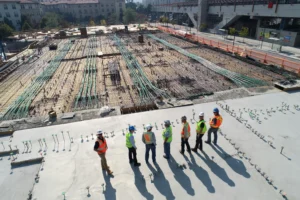A homeowner has to consider a few things in advance before entering into a roofing contract. The roofing sector recorded growth in recent years owing to the new home construction started in the very low interest rates of the year 2020 and 2021. Such growth translates into a greater number of housing purchases. Also, building outlays for alteration and repairs means that money should be spent to secure the roof over your head. Given how many contractors exist today though, caution should be exercised while choosing one for your roofing job. In this guide, we will explain what you should do before signing a roofing contract.
What is a Roofing Contractor?
The roofing contractor is one who inspects, installs, repairs, and renovates roofs. They use different types of roofing materials including shingles, tiles, metal, and single-ply membranes. Roofing contractors provide special services that may be applied to homes or businesses. Their work demands good knowledge of local building rules and laws for safety purposes and to comply with requirements.
What Does a Roofing Contractor Do?
A roofing contractor will begin their work by inspecting the present status of the roofing. They will then repair, replace, or maintain the roofing to stop leaks, destruction, and wear and tear. The contractors give estimates regarding the cost needs for construction. They clean gutters and seal the joints to prevent the wear and tear of the roof.
On the other hand, specialized roofing contractors have a better experience with installation of green roofs and solar panels. Roofing contractors also oversee their own team apart from other subcontractors mainly to deal with any problem in the work that arises to help attain the set goals not only timewise but in the budget aspect as well.
Types of Roofing Contractors
Not all roofing contractors are the same, and knowing the type of roofing contractor you need really makes quite a difference. Here’s a breakdown of the various types of roofing contractors currently available in the market to meet your needs:
Residential Roofing Contractors
This sort of roofing contractor devotes their category to the home improvement part of the market. It is recommended that a residential roofing contractor be hired in order to get the most value out of an investment put into a family house, as such a contractor is used to working with residential roofing materials like wood shake, tile, metal.
Commercial Roofing Contractors
To meet the requirements and necessities of an average office building or commercial warehouse one would hire a commercial roofing contractor. The primary reason companies utilize such services is the in-depth skills and experience dealing with a range of challenging materials that include metal panels, EPDM and TPO.
General Roofing Contractors
A general roofing contractor is a qualified individual who inspects, installs, repairs, replaces, and maintains the roofs of residential and commercial houses. They have vast experience with various types of materials, oversee every detail of the roofing process, as well as deal with subcontractors and suppliers, when applicable.
Specialized Roofing Contractors
If any roofing projects require utmost innovation or creativity then these contractors would be the ideal choice, having a deep knowledge of the market. Plus, their advanced skills allow them to have a competitive edge over others, specializing with solar panels, installing green roofing, and offering custom roofing solutions.
Verify Contractor Credentials
Before signing any roofing contract, it is very important to check a contractor’s credentials. Here’s how you can do that effectively!
Check for Licensing and Insurance
First and foremost, check whether the contractor has the right licenses and is able to work in your county or state. They should also have the requisite insurance policies in place, including at a minimum liability insurance coverage and worker’s compensation. This will save you from any liability in case there are mishaps or damages.
References and Prior Work Review
A contractor’s history may tell you much about him. Ask for a list of references so you are able to call former clients to understand the level of satisfaction that clients feel regarding the contractor’s work. Moreover, inquire into different types of projects that they have worked on in the past and would further be able to work upon.
Look for Online Reviews and Ratings
Look for reviews online; check the ratings on Yelp, Google, or Facebook. While looking at the review trend of the contractor, repeated praise by a contractor is a plus, while an ever-growing pattern of complaints is a red flag.
Understand the Contract Details
After carefully analyzing all the possible contractors, if you decide to hire a particular contractor, make sure that you read every detail of the contract. A clear understanding of every detail avoids any unpleasantness and blame in the future.
Scope of Work and Project Timeline
The contract should clearly state what work would be done on your roofing and the sequence of how they’ll be done. This clears up all unnecessary expectations and confusions. It should also contain the date of commencement and the date of ending of the project, so everyone is on the same page. This keeps things orderly and in sequence.
Payment Terms and Financing Options
Knowing how much you have to pay for upfront costs and what the accepted methods of payment are is one of the ways to hopefully navigate your budget. And if financing options are open, make sure to talk about the terms. It will help break down knowing this information to lower some risks of hidden costs for you.
Warranty and Maintenance Clauses
You should always ask questions regarding the period of the warranty and what it covers. Other than that, understand the maintenance that needs to be done in order to keep the roof intact. A good warranty and comprehensive coverage protect your investment for years to come.
Evaluate Materials and Techniques
So, while planning out the roofing project, know that there has to be special emphasis on what materials roofing techniques would best suit the crown of your house. Let us have a look at these elements in detail!
Choose Quality Roofing Materials
Slate, clay tiles, metal roofing, and asphalt shingles are some of the materials that are incorporated in roofing. Each has its positive and negative side. For example, metal roofing has quite a steep price but can survive through storms and also has a long life. Economically, asphalt shingles are within reasonable prices and can be acquired without any trouble. Last but not the least, a budget friendly material should be durable and esthetically pleasing.
Discuss Installation Techniques
Even with the best materials, bad installation renders everything futile. The owner should discuss with the contractor about their installation techniques before they initiate the work. For example, well-sealed and well-flashed roofing components including chimneys or skylights among others should be suitably installed. They should also apply the right underlayment to enhance water resistance, besides using proper nailing practices for the long-term stability of your roof. These things will ensure your roof is not just well-installed and lasts for a long period of time.
Evaluate the Environmental Considerations
It is wise and in line with social responsibility to consider the environment while replacing your roof. Install an energy-efficient and ecological roof to reduce utility costs. Or go with shingle roofing as it produces significantly less waste than other available forms of roofing. Check the local incentives that pay money to apply sustainable roofing on your house to offset its initial expense. Such eco-friendly decisions are quite beneficial to you and the environment.
Legal and Regulatory Compliance
Before you start signing a roofing contract, understand all the legalities involved. Check whether your project needs any special permit or follows the building code of your locality, for which it may face penalties or require the re-doing of the work already completed. It is equally important to check that your contractor is informed about this and follows it.
Another important aspect is the issue of liability: whether the contractor has enough insurance in case injuries or damages arise due to the execution of their work. Similarly disturbing will be how the warranty on material and workmanship works, considering it’s your protection or security against some unforeseen changes.
Wrapping Up
In conclusion, probably the most important thing for a home is to be safe and secure so that it can last in spite of the harsh elements. To achieve this, make sure to go through the roofing contract and do not be afraid to ask your contractor questions regarding parts you do not understand.
An experienced contractor will provide a detailed list of expenses, timelines, materials used, and warranties to help keep things organized without surprises. The aforementioned steps will let you confidently move ahead and give your home the strong, reliable roof it needs.
FAQs
Should I Pay A Roofing Contractor Upfront?
Absolutely not! A contractor should receive 10-20 percent of the total amount as a deposit, which is how the business operates, but you should never pay them the entire fee up front. The rest of the payment should be done once the work has been completed.
Does A Roofing Contractor Have To Be Licensed?
Yup! Some states have a particular license for roofing contractors. As a safeguard and to be on the safe side, it is advisable that you verify with your contractor for the licenses that are applicable in your area so that they can be able to explain to you the necessary building code requirements for your region.
Can a general contractor install green roof systems?
Hiring a general contractor to install green roof systems is usually not recommended. Although a general contractor can be consulted for most residential or commercial roofing work, specialized roofing contractors are often best for installing a green roof. Roofing specialists have particular expertise, tools, and knowledge of different roofing materials and techniques.
Should Roofing Contractor Be Present with Insurance Adjuster?
Yes, for a client to have their expectations met, the presence of the roofing contractor during the insurance adjuster’s visit is essential. They need to be present to highlight damage or concerns which would otherwise go unnoticed. With their knowledge, they can make sure that the adjuster notices every detail of the damage so that it is properly evaluated and access given for repairs for all that is requested.







